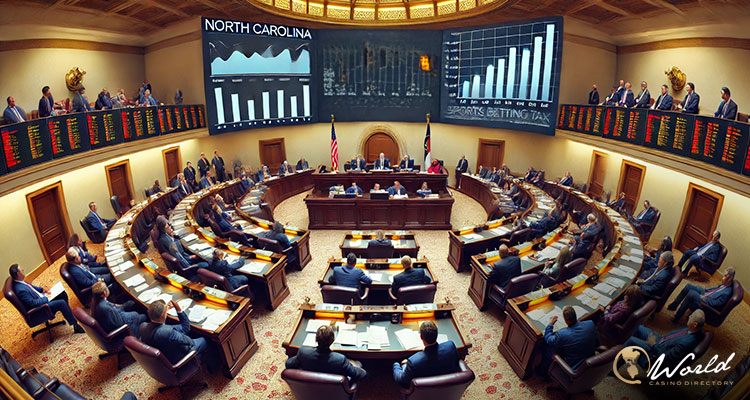North Carolina lawmakers are moving forward with a sweeping budget plan that could significantly transform how sports betting revenue is taxed and distributed, particularly benefiting the state’s flagship public universities.
Under the proposed two-year Senate budget, the tax rate for online sports betting operators would jump from 18% to 36%, placing North Carolina among the top five highest-taxed jurisdictions in the country for sports wagering. If enacted, the tax hike would take effect October 1, 2025.
The plan, unveiled Monday by Senate Republicans, also seeks to broaden revenue-sharing among schools in the University of North Carolina (UNC) System. For the first time, the University of North Carolina at Chapel Hill and North Carolina State University would be included in the sports betting revenue distribution — but only if they agree to play more games against in-state public universities.
“This is tied to the sports gambling changes,” a Senate Republican spokesperson told WRAL News. “With State and UNC in at a new ‘power conference athletics’ tier for the sports gambling revenue, it is our intent that they play the other system schools.”
Big Payouts for Universities, With Conditions Attached
Until now, 13 of the state’s UNC System schools have benefited from the state’s sports betting tax revenue. Each currently receives $300,000, along with a 20% share of leftover proceeds following mandatory distributions.
The proposed budget would change that formula substantially. Payouts would increase and vary in amount:
- Four schools — Elizabeth City State, Fayetteville State, UNC Pembroke, and Winston-Salem State — would receive $500,000 each.
- Six institutions, including UNC-Asheville, UNC-Greensboro, and NC Central, would get $1 million each.
- Appalachian State, UNC Charlotte, and East Carolina would receive $1.5 million apiece.
After these allocations, 20% of any remaining proceeds would be split among all participating universities. Additionally, 10% would be designated for UNC, another 10% for NC State, and a final 10% for the North Carolina Major Events, Games, and Attractions Fund. The remainder would go into the state’s General Fund.
Forecasts estimate UNC and NC State would receive $24.4 million during the fiscal year beginning July 1, 2025, and $31 million the following year.
Senate leader Phil Berger, a Republican from Rockingham County, defended the shift in revenue allocation. “It’s our feeling that the success of the sports wagering program itself is something that has inured to the benefit of many of the campuses, and we wanted to extend it to other campuses,” he said.
Required Basketball Matchups Aim to Boost Economic Impact
As part of the new funding model, the budget mandates that UNC and NC State schedule additional basketball games — both men’s and women’s — against fellow UNC System schools.
By the 2039–2040 season, each university must play a minimum of three regular-season or exhibition games against every NCAA Division II school in the system and at least two regular-season matchups against each Division I peer. The bill stipulates that at least one game against each school be played on the road.
There are four Division II and 11 Division I institutions within the UNC System, excluding UNC and NC State. The aim is not only to create more competitive opportunities across the system but to drive local economic activity through increased in-state athletic events.
Surging Revenue from Sports Betting Spurs Policy Shift
North Carolina’s online sports betting market, which launched in March 2024, has far outpaced early projections. In just over a year, the state collected more than $135 million in taxes from its eight licensed sportsbooks, including industry giants like FanDuel, DraftKings, BetMGM, and Fanatics.
Original forecasts had predicted that it would take several years to reach $100 million annually, but the market hit that mark in its first 12 months. Total gross gaming revenue from North Carolina sportsbooks is estimated at nearly $752 million, with over $7.2 billion in total wagers placed since launch.
By doubling the tax rate, the Senate expects to generate an additional $53.4 million in the 2025–26 fiscal year and another $79.8 million in 2026–27. The budget’s broader goal is to address a potential state budget shortfall projected as early as 2026, using sports betting as a funding lifeline for public programs — particularly university athletics.
Context and Legislative Outlook
While the Senate appears poised to approve its version of the budget, it must still reach agreement with the House, which has yet to release its proposal.
In parallel, several other bills are circulating in the legislature that could reshape the betting landscape. One, for instance, proposes banning prop bets involving college athletes, while another would allocate sports betting revenue to fund stipends for high school coaches.
Though some states have struggled to pass sports betting tax increases — with recent efforts stalling in Maryland, New Jersey, and Ohio — North Carolina’s overwhelming early success in the market may give this legislation a stronger chance of survival.
As UNC and NC State ramp up spending on their athletic programs and prepare for revenue-sharing agreements with student-athletes, the new funding mechanism offers a timely infusion of cash. UNC has reportedly projected the need to raise an additional $50 million to sustain its expanding football and basketball investments, while NC State’s recent hire of basketball coach Will Wade also signals a commitment to increased spending.


